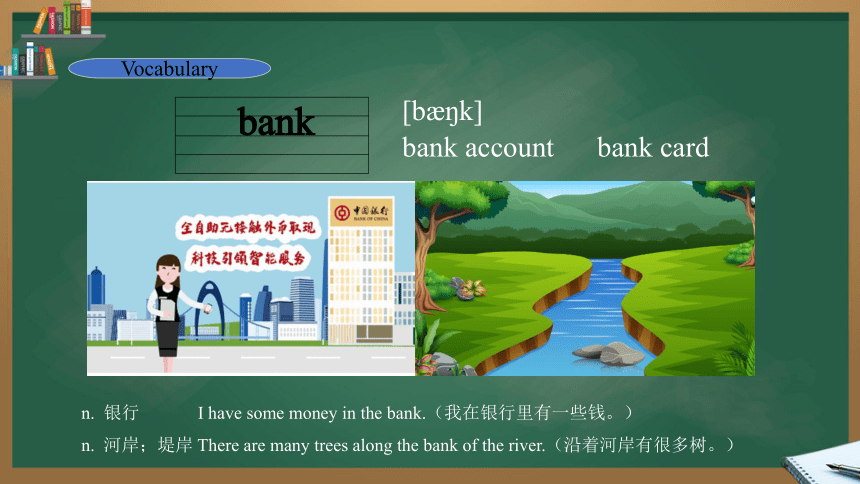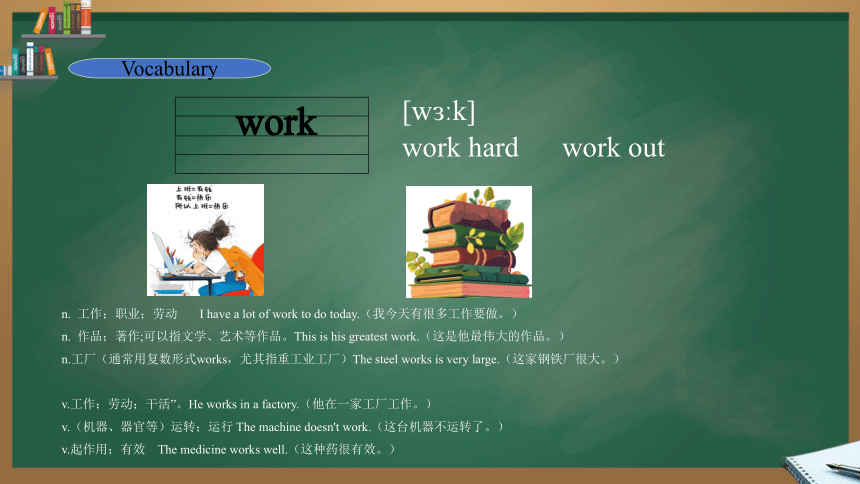Unit 4 Where do you work ? Lesson 19 课件(共18张PPT)
文档属性
| 名称 | Unit 4 Where do you work ? Lesson 19 课件(共18张PPT) |  | |
| 格式 | pptx | ||
| 文件大小 | 34.7MB | ||
| 资源类型 | 教案 | ||
| 版本资源 | 人教精通版(三年级起点) | ||
| 科目 | 英语 | ||
| 更新时间 | 2024-11-23 10:29:35 | ||
图片预览







文档简介
(共18张PPT)
Unit4 Where do you work
学习目标
能够在真实语境中向他人介绍自己家人和朋友的职业、工作地点、所从事的活动等基本状况。
掌握以下词汇:cinema bank work study in at
Vocabulary
[ s n m ]
n. 电影院 We went to the cinema last night.(我们昨晚去了电影院。)
n.电影业、电影艺术 He works in the cinema.(他从事电影行业。)
go to the cinema
cinema
Vocabulary
bank
[b k]
n. 银行 I have some money in the bank.(我在银行里有一些钱。)
n. 河岸;堤岸 There are many trees along the bank of the river.(沿着河岸有很多树。)
bank account bank card
Vocabulary
work
[w k]
n. 工作;职业;劳动 I have a lot of work to do today.(我今天有很多工作要做。)
n. 作品;著作;可以指文学、艺术等作品。This is his greatest work.(这是他最伟大的作品。)
n.工厂(通常用复数形式works,尤其指重工业工厂)The steel works is very large.(这家钢铁厂很大。)
v.工作;劳动;干活”。He works in a factory.(他在一家工厂工作。)
v.(机器、器官等)运转;运行 The machine doesn't work.(这台机器不运转了。)
v.起作用;有效 The medicine works well.(这种药很有效。)
work hard work out
Vocabulary
study
[ st di]
名词词性
表示“学习;研究”,例如:His study of history is very interesting.(他对历史的研究非常有趣。)
表示“书房”,例如:My father is reading in his study.(我爸爸正在他的书房里看书。)
动词词性
表示“学习;研究”,例如:I need to study for my math test.(我需要为我的数学考试学习。)
表示“仔细观察;审视”,例如:The scientist studied the specimen carefully.(科学家仔细观察了标本。)
study hard study abroad
Vocabulary
in
[ n]
表示“在……里面”,例如:The book is in the bag.(书在书包里。)
表示“在……期间”,例如:We go to school in the morning.(我们早上上学。)
表示“穿着”,例如:The girl in red is my sister.(穿红色衣服的女孩是我妹妹。)
表示“用……语言”,例如:Can you speak in English (你能用英语说话吗?)
in the morning/afternoon/evening
in front of
in the end
Vocabulary
at
[ t]
表示“在……(地点)”,例如:I am at school.(我在学校。)
表示“在……(时间)”,例如:We have dinner at 6 o'clock.(我们在6点吃晚饭。)
表示“向……;对……”,例如:She smiled at me.(她对我微笑。)
表示“处于……状态”,例如:He is at work.(他在工作。)
at home at school at the same time
Just talk
Just talk
Mr White: Hi, Mrs Wu! Nice to see you again.Hi, Mrs Wu! Nice to see you again.
Mrs Wu: Nice to see you, too! Nice to see you, too!
Just talk
Mr White: Hi, Mrs Wu! Nice to see you again.Hi, Mrs Wu! Nice to see you again.
Mrs Wu: Nice to see you, too!Nice to see you, too!
Mr White: Where do you work now Where do you work now
Mrs Wu: I work in Beijing Cinema.I work in Beijing Cinema.
句型结构:
问句:Where do you work/study(+其他)?
答句:I/we work/study+(表示地点的)介词短语.
where 意为“哪里”,用来对地点进行提问。
问句中的“do”是助动词,帮助构成疑问句
Lesson 19
Just talk
How about you
Mr White: I work at the Bank of China.I work at the Bank of China.
Just talk
询问他人在哪里工作或学习的句型
Where does+主语(第三人称单数)+work/study(+其他)?
例如:Where does he work 他在哪里工作?
-He Works in a hospital.他在一家医院工作。
Where do+主语(第三人称单数)+work/study(+其他)?
例如:Where do they work 他们在哪里工作?
-They work at Sunny School. 他们在阳光学校工作。
Just talk
两种词性的work
work 在课文中作动词,意为“工作”。除此之外,work还可以作名词,也表示“工作”。
例如:The workers in the factory work 40 hours a week.
这个工厂里的工人每星期工作40个小时。(动词)
Do you like your works 你喜欢你的工作吗? (名词)
Lesson 19
Just talk
work与job
work 指人们日常生活和工作中从事的体力或脑力劳动, 是不可数名词。
例如: I have a lot of work to do today. 我今天有很多工作要做。
work还有动词词性,意为“上班,劳动”
例如:I work in a school. 我在一所学校上班。
job 指具体的职业或者零工,是可数名词。
例如:What’s your job 你做什么工作?
Just talk
too的两种词义
课文: Nice to see you, too. 见到你很高兴!
(1) too意为“也”, 一般放在句尾。
例如:-Nice to meet you.见到你很高兴。
-Nice to meet you, too.见到你也很高兴。
How are you 你好吗? -I‘m fine. Thank you. And you 我很好,谢谢你,你呢?
-I’m fine, too. Thanks. 我也很好,谢谢。
(2)too 可用于形容词或副词之前,意为“太,过于”。
例如:He drives too fast. 他开车开得太快了。
Just talk
Mr White: How about your daughter Where do you study now
Daughter: I study at Sunny School.I study at Sunny School.
感谢聆听
Unit4 Where do you work
学习目标
能够在真实语境中向他人介绍自己家人和朋友的职业、工作地点、所从事的活动等基本状况。
掌握以下词汇:cinema bank work study in at
Vocabulary
[ s n m ]
n. 电影院 We went to the cinema last night.(我们昨晚去了电影院。)
n.电影业、电影艺术 He works in the cinema.(他从事电影行业。)
go to the cinema
cinema
Vocabulary
bank
[b k]
n. 银行 I have some money in the bank.(我在银行里有一些钱。)
n. 河岸;堤岸 There are many trees along the bank of the river.(沿着河岸有很多树。)
bank account bank card
Vocabulary
work
[w k]
n. 工作;职业;劳动 I have a lot of work to do today.(我今天有很多工作要做。)
n. 作品;著作;可以指文学、艺术等作品。This is his greatest work.(这是他最伟大的作品。)
n.工厂(通常用复数形式works,尤其指重工业工厂)The steel works is very large.(这家钢铁厂很大。)
v.工作;劳动;干活”。He works in a factory.(他在一家工厂工作。)
v.(机器、器官等)运转;运行 The machine doesn't work.(这台机器不运转了。)
v.起作用;有效 The medicine works well.(这种药很有效。)
work hard work out
Vocabulary
study
[ st di]
名词词性
表示“学习;研究”,例如:His study of history is very interesting.(他对历史的研究非常有趣。)
表示“书房”,例如:My father is reading in his study.(我爸爸正在他的书房里看书。)
动词词性
表示“学习;研究”,例如:I need to study for my math test.(我需要为我的数学考试学习。)
表示“仔细观察;审视”,例如:The scientist studied the specimen carefully.(科学家仔细观察了标本。)
study hard study abroad
Vocabulary
in
[ n]
表示“在……里面”,例如:The book is in the bag.(书在书包里。)
表示“在……期间”,例如:We go to school in the morning.(我们早上上学。)
表示“穿着”,例如:The girl in red is my sister.(穿红色衣服的女孩是我妹妹。)
表示“用……语言”,例如:Can you speak in English (你能用英语说话吗?)
in the morning/afternoon/evening
in front of
in the end
Vocabulary
at
[ t]
表示“在……(地点)”,例如:I am at school.(我在学校。)
表示“在……(时间)”,例如:We have dinner at 6 o'clock.(我们在6点吃晚饭。)
表示“向……;对……”,例如:She smiled at me.(她对我微笑。)
表示“处于……状态”,例如:He is at work.(他在工作。)
at home at school at the same time
Just talk
Just talk
Mr White: Hi, Mrs Wu! Nice to see you again.Hi, Mrs Wu! Nice to see you again.
Mrs Wu: Nice to see you, too! Nice to see you, too!
Just talk
Mr White: Hi, Mrs Wu! Nice to see you again.Hi, Mrs Wu! Nice to see you again.
Mrs Wu: Nice to see you, too!Nice to see you, too!
Mr White: Where do you work now Where do you work now
Mrs Wu: I work in Beijing Cinema.I work in Beijing Cinema.
句型结构:
问句:Where do you work/study(+其他)?
答句:I/we work/study+(表示地点的)介词短语.
where 意为“哪里”,用来对地点进行提问。
问句中的“do”是助动词,帮助构成疑问句
Lesson 19
Just talk
How about you
Mr White: I work at the Bank of China.I work at the Bank of China.
Just talk
询问他人在哪里工作或学习的句型
Where does+主语(第三人称单数)+work/study(+其他)?
例如:Where does he work 他在哪里工作?
-He Works in a hospital.他在一家医院工作。
Where do+主语(第三人称单数)+work/study(+其他)?
例如:Where do they work 他们在哪里工作?
-They work at Sunny School. 他们在阳光学校工作。
Just talk
两种词性的work
work 在课文中作动词,意为“工作”。除此之外,work还可以作名词,也表示“工作”。
例如:The workers in the factory work 40 hours a week.
这个工厂里的工人每星期工作40个小时。(动词)
Do you like your works 你喜欢你的工作吗? (名词)
Lesson 19
Just talk
work与job
work 指人们日常生活和工作中从事的体力或脑力劳动, 是不可数名词。
例如: I have a lot of work to do today. 我今天有很多工作要做。
work还有动词词性,意为“上班,劳动”
例如:I work in a school. 我在一所学校上班。
job 指具体的职业或者零工,是可数名词。
例如:What’s your job 你做什么工作?
Just talk
too的两种词义
课文: Nice to see you, too. 见到你很高兴!
(1) too意为“也”, 一般放在句尾。
例如:-Nice to meet you.见到你很高兴。
-Nice to meet you, too.见到你也很高兴。
How are you 你好吗? -I‘m fine. Thank you. And you 我很好,谢谢你,你呢?
-I’m fine, too. Thanks. 我也很好,谢谢。
(2)too 可用于形容词或副词之前,意为“太,过于”。
例如:He drives too fast. 他开车开得太快了。
Just talk
Mr White: How about your daughter Where do you study now
Daughter: I study at Sunny School.I study at Sunny School.
感谢聆听
同课章节目录
- Unit 1 We have new friends.
- Lesson 1
- Lesson 2
- Lesson 3
- Lesson 4
- Lesson 5
- Lesson 6
- Unit 2 She looks cute.
- Lesson 7
- Lesson 8
- Lesson 9
- Lesson 10
- Lesson 11
- Lesson 12
- Unit 3 My father is a writer.
- Lesson 13
- Lesson 14
- Lesson 15
- Lesson 16
- Lesson 17
- Lesson 18
- Fun Time 1
- Recycle 1
- Recycle 2
- Fun Reading
- Unit 4 Where do you work ?
- Lesson 19
- Lesson 20
- Lesson 21
- Lesson 22
- Lesson 23
- Lesson 24
- Unit 5 Is this your school bag?
- Lesson 25
- Lesson 26
- Lesson 27
- Lesson 28
- Lesson 29
- Lesson 30
- unit 6 It's a grapefruit.
- Lesson 31
- Lesson 32
- Lesson 33
- Lesson 34
- Lesson 35
- Lesson 36
- Fun Time 2
- Recycle 1
- Recycle 2
- Fun Reading
- 旧版资料
- Unit 2 She looks active.
- Unit 3 My father is a teacher.
- Unit 4 What does your mother do?
- Unit 6 Whose T-shirt is that?
